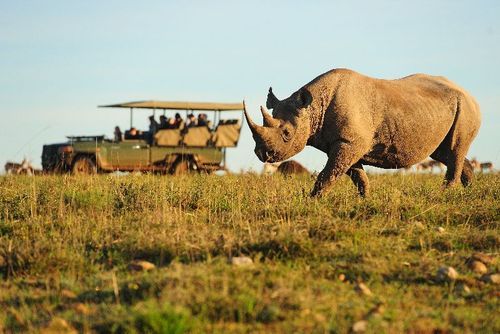Join the Shamwari Conservation Experience to volunteer in South Africa and for a chance to be involved with the conservation efforts of the world renowned Shamwari Game Reserve. This project was established to return the land and the wildlife species which used to inhabit it, back to its former glory.
With a dedicated wildlife department, Animal Rehabilitation Centre, Animal Hospital and Rhino Awareness Centre, volunteers will gain first-hand experience and insight to Shamwari through a vast array of tasks during their time here.
The objective is to give volunteers an opportunity to personally experience and add value to a project which has been globally recognised for its conservation efforts and expertise.
Itinerary
Day 1
Arrival into South Africa via Port Elizabeth airport, where you will need to transfer onto the shuttle bus to the project site. Once you have arrived, you will spend the rest of the day settling in and meeting staff and the rest of the volunteers on the Shamwari conservation experience.
Day 2-13
Project Days. Rise early and eat breakfast for 7.30am. You will meet your fellow volunteers and volunteer co-ordinators from 8am. Volunteers with begin morning activities which are distributed on a rotational basis. Operations run from 8am to 5pm basis. There will be lunch from 12-1pm every day. Afternoon activities begin from 1pm and run until 5pm. Evenings (after 5.30pm) and weekends are generally available for volunteers to spend as they wish.
Day 14
Unfortunately, today is your final day. Once you have said goodbye to the staff and facilitators, you will then transfer back to airport for your return flight home or you will commence onward independent travel plans.
Project Activities
Game count & monitoring
Annual game counts of species (including rhino, elephants, lions, leopards and antelope) are carried out in order to establish the carrying capacity of the reserve, the movement of animals to and from the area, as well as predator to prey ratios.
Telemetry tracking & research
Telemetry tracking (or tracking using remote sources such as wire or radio) is used throughout Shamwari - particularly with regards to the more elusive species like cheetah and leopards. Restoration and rehabilitation of reserve landscapes and fencing This is integral to the wellbeing of the reserve and ensures its long-term revival as a pristine landscape suitable for an extensive collection of flora and fauna.
Maintenance of the reserve as a healthy breeding centre
Shamwari is an important breeding centre for a variety of species. Management here can refer to anything from veld (open country or grassland) conditions assessment, mapping of breeding area, mapping of alien vegetation, monitoring animal numbers and managing water points.
Alien plant control
An essential part of your volunteer duties here, alien plant control helps to get rid of unwanted (and potentially poisonous plants), increase the natural biodiversity of the reserve, as well as decrease fire risk.
Volunteering at Born Free Foundation
An opportunity will be given on a weekly basis for individuals to volunteer with big cats (lions and leopards) at the Born Free Big Cat Sanctuary - a world-renowned animal rehabilitation centre.
Volunteering at the Animal Rehabilitation Centre
Shamwari Animal Rehabilitation Centre was set up to aid in the rehabilitation of injured animals found on the reserve and surrounding community. The aim is to give the animals the short term care they need so that they can be successfully released back into the environment.
Community Projects
This responsibility involves the education of local communities in the benefits of conserving biodiversity, and stresses the importance of conserving the natural habitats of Shamwari and the surrounding area. Weekly trips are made into the local community to assist in various community projects that range from creating and maintaining vegetable gardens, recycling projects, painting classrooms and building jungle gyms.
Restoration and Rehabilitation of Reserve Landscapes
The need to return the once pristine landscape to its original splendour includes the collecting and removal of old fence lines and rehabilitating degraded and overgrazed land.
Research Projects
These projects are often undertaken in conjunction with both local and foreign research and academic institutions and may range from elephant fertility testing to capturing data on lesser-known species such as Brown Hyena.


